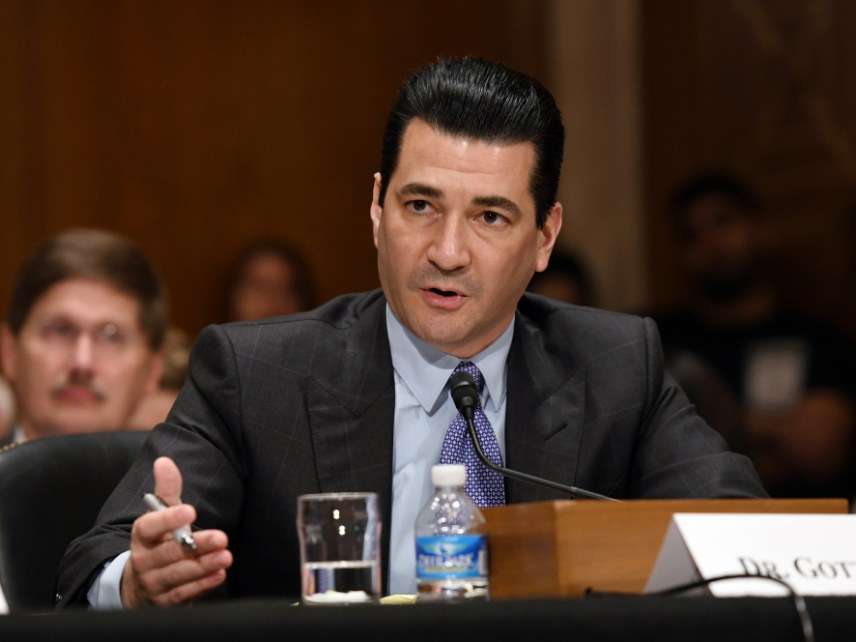'Food Police' Thriving Under Alleged Deregulator Trump
When it comes to the FDA and USDA, where's the scaling back of rules?

Last week, a fantastic front-page New York Times article looked at the phenomenon of regulatory fatigue, set against the Trump administration's claims to be focusing huge attention on many of the rules that lie at the heart of that fatigue. The in-depth Times piece looked at regulations impacting apple growers—including everything from water and labor rules to the "assortment of rules, guidances, standards and training requirements associated with ladders, including how to achieve proper angling and how to prevent falling when filling produce bags."
The ladder issue was particularly apropos because of the name of an apple farm profiled in the story, Indian Ladder Farms in upstate New York.
Many of the rules the article discusses are inane, costly, and unhelpful. Together, these rules, put in place by faceless acronyms—including the EPA, FDA, USDA, OSHA, and other state and federal agencies—can crush small apple growers, as I told the Times in the piece.
"So many of the farmers I've spoken with tell me that stricter and stricter regulations have put many of their neighbors and friends out of business, and in doing so cost them their homes, land and livelihoods," I say in the Times piece. "For many farmers, rolling back regulations is the only way they can survive."
Coincidentally, just days before the Times piece was published, President Donald Trump used remarks he made in the White House's Roosevelt Room to tout his purported deregulatory fervor and successes, touting his administration's first year as the "most far-reaching regulatory reform" efforts ever by a U.S. president.
"We have decades of excess regulation to remove," Trump said. "To help launch the next phase of growth, prosperity and freedom, I am challenging my cabinet to find and remove every single outdated, unlawful and excessive regulation currently on the books."
I have no doubt there are "decades of excess regulation to remove." There are. But I have no faith whatsoever either in the will or abilities of Trump or his appointees to carry out this rollback.
Consider, for example, that Trump made a campaign pledge to kick the "FDA food police" out of Washington. His controversial executive order mandating that agencies revoke two regulations for every new one they seek to adopt could be used as a tool to accomplish just that.
But like seemingly everything else Trump, his pledges and orders resemble little more than some sort of chintzy window dressing.
FDA commissioner Scott Gottlieb, appointed by Trump, appears not even to share the Trump administration's purported zeal to cut food regulations. As a Regulatory Affairs Professional Society post noted recently, the Trump administration "has yet to take a saw to its regulations, and FDA Commissioner Scott Gottlieb seemed to walk back Trump's pledge" to do so.
The website Food Dive also described Gottlieb's position on food regulations as almost entirely nebulous.
"It hasn't been easy to get a clear sense of where the new FDA director stands on many food safety and nutrition issues," it reported.
There's good reason to be skeptical of the willingness of Gottlieb's FDA to cut food regulations. For example, he doubled down last fall on awful Obama administration menu-labeling rules, part of the Affordable Care Act, saying the FDA will act in part because Gottlieb is a "doctor" and "father." He's also continued the Obama administration's nannying pursuit of all things "Loko," going after the snortable chocolate Coco Loko with the same gusto Obama's FDA targeted the caffeinated alcohol beverage Four Loko.
It's not just Trump's FDA that stinks. His USDA has also been lousy. The Trump administration rolled back Obama administration rules on USDA school lunches—so that the rules are different than they were recently but still awful like they were before that—with the embarrassing claim to be "making school lunches great again." The USDA also recently targeted Maine after the state adopted a food sovereignty law that would have allowed cities and towns in the state to deregulate local meat sales.
When it comes to rolling back burdensome food regulations, Trump's promises appear to be hollow at best.
Despite his bold, unsupported claims of an historic year of regulatory reform, from where I'm sitting I see there are still about as many food regulations worth scrapping today as there were when Trump took office last year.
The so-called food police are still the law in these parts. The only difference now is that a new cast of characters reports to a new sheriff, President Trump.


Show Comments (113)